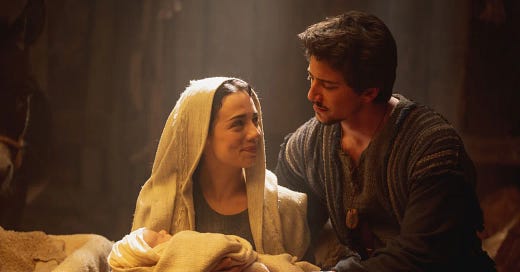A few thoughts on Journey to Bethlehem
Things that work, and things that don't, in the film that puts a pop-rock-musical romantic-comedy spin on the Nativity story.
Journey to Bethlehem, the pop-rock musical about the birth of Jesus, is now in theatres. I meant to write something review-ish about it on opening day, but a few last-minute changes to my schedule got in the way. Still, better late than never, right?
As always when I’ve been following a film’s publicity campaign so closely, it feels like there’s so much to say about the film itself that forcing my thoughts into a regular review format would be just an extra layer of work. So instead I’m going to post my thoughts in point form.
Today, I’m posting some general thoughts about the film, which I have grouped into general observations, things that worked for me, and things that didn’t. I’ll be analyzing the film in even more detail in the days to come.
General observations
Musical Bible films seem to be coming at 25-year intervals. In 1973, we had three such films, as Godspell, Jesus Christ Superstar, and Johnny Cash’s The Gospel Road put a modern spin on the life, death, and teachings of Jesus for the hippie generation. Then, in 1998, The Prince of Egypt gave us a singing animated Moses for the Disney Renaissance era. And now, in 2023, there’s this.
Journey to Bethlehem is different from those other musicals, though, insofar as it is a “family film” made by people who have specialized in movies and TV shows for the high-school crowd (Glee, High School Musical, The Prom, etc.)—so it lacks both the counter-cultural relevance of the hippie films (which were not made to be watched with one’s parents) and the cultural ambition of the Moses cartoon (which was trying very hard to be a Lawrence of Arabia-style epic).
As I noted in my post on the soundtrack album, about half of the songs are rooted in fictitious subplots that were invented for the movie—the arranged marriage between Mary and Joseph, Antipater’s feelings about his father Herod, etc.—while maybe a fifth of the soundtrack consists of traditional Christmas-style songs and the other three-tenths or so consists of new songs that are rooted in basically biblical scenarios (Mary’s pregnancy, Joseph’s doubts).
I think it’s safe to say that this film is, first and foremost, a romantic comedy of sorts. It is definitely structured like one. The birth of Jesus is definitely part of the narrative, but pay attention to the voice-over narration (especially how it ends), the story beats (the meet-cute, the flirtations, the arguments, the climactic… spoiler… between Mary and Joseph), and the multiple songs in which Mary and Joseph wrestle with the fact that they are in an arranged relationship. This, it seems clear, is where the real thrust of the narrative lies.
Recent films like this one and 2006’s The Nativity Story have really leaned into the idea that Mary had no say in her betrothal to Joseph, that she protested or resisted it on some level, and that she was still coming to terms with it when the angel came along and said, oh, by the way, you’re going to be pregnant, too. So the Mary of these films ends up struggling to accept her pregnancy at the very same time that she’s struggling to accept her arranged marriage.
It’s particularly striking how, in this film, when Mary first learns about her betrothal, she worries that she’ll end up “keeping house and making babies”—and lo and behold, it turns out she’s going to have a baby even sooner than she thought!
You can’t help wondering—particularly in light of how modern the movie’s sensibilities are in other areas—what sort of message this sends to today’s young girls. “Yes, Mary is a regular girl just like you who resists the idea that other people should tell her what to do with her life… but eventually she did let them tell her what to do with her life, so… you should too?”
Keep reading with a 7-day free trial
Subscribe to Thoughts and Spoilers to keep reading this post and get 7 days of free access to the full post archives.



